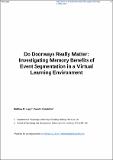Do doorways really matter : investigating memory benefits of event segmentation in a virtual learning environment
Abstract
Event segmentation allows the flow of information experienced in life to be partitioned into distinct episodes, facilitating understanding of the world, action within it, and the ability to store information in memory. One basis on which experiences are segmented is the presence of physical boundaries, such as walking through doorways. Previous findings have shown that event segmentation has a significant influence on memory, with better memory for events occurring within a single boundary (compared to events that cross boundaries). By manipulating the features of boundaries and the amount of information presented between boundaries the present research investigates the nature of event boundaries. We make use of a virtual learning environment to present lists of words in virtual rooms, testing memory for the word lists as a function of the presence or absence of spatial-temporal gaps and physical boundaries during encoding (i.e., by maintaining participants within individual rooms or moving them through doorways between rooms). Across four experiments, we show that segmenting information with spatial-temporal gaps results in an increase in clustering (reflecting the structure imposed at encoding) an increase in the number of words remembered during later tests of episodic recall (a memory benefit) and an increase in recalling the words in the order of presentation. Importantly, however, the data show that the presence of doorways is not required for event segmentation to benefit memory: increases in clustering, memory for temporal order and recall performance were found with temporal gaps alone. Furthermore, the results suggest that episodic memory may be optimised if the amount of information between boundaries can be maintained within working memory. We discuss the implications of the findings for Event Segmentation Theory and propose an alternative theoretical account of the episodic memory benefits based on temporal clustering. [Abstract copyright: Copyright © 2020 Elsevier B.V. All rights reserved.]
Citation
Logie , M R & Donaldson , D I 2021 , ' Do doorways really matter : investigating memory benefits of event segmentation in a virtual learning environment ' , Cognition , vol. 209 , 104578 . https://doi.org/10.1016/j.cognition.2020.104578
Publication
Cognition
Status
Peer reviewed
ISSN
0010-0277Type
Journal article
Collections
Items in the St Andrews Research Repository are protected by copyright, with all rights reserved, unless otherwise indicated.

